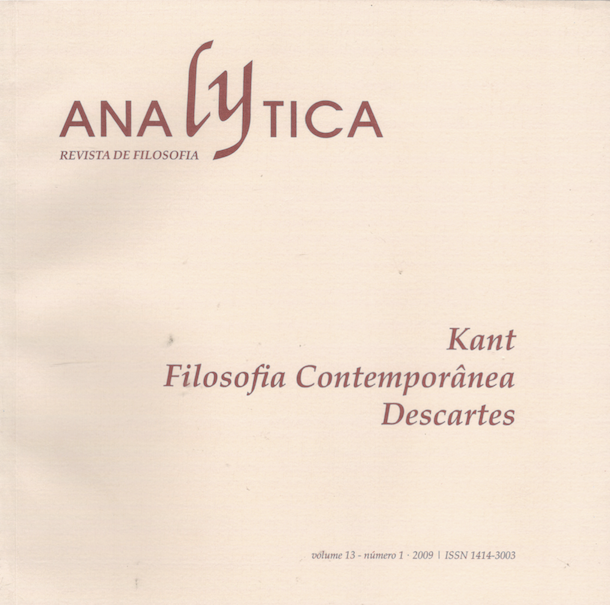Kant e o fim da ontologia
Resumo
Mediante uma análise da noção de juízo nos textos pré-críticos e naCrítica da razão pura, trata-se de investigar o projeto kantiano de substituir o "nome orgulhoso de ontologia pela denominação mais modesta de uma mera analítica do entendimento puro" (A 247/B 303). Em vez de selar o destino de toda e qualquer ontologia, de modo a fazer daCrítica da razão pura, como pretendem as interpretações influenciadas pelo neokantismo, um "empreendimento de transformação da metafísica em filosofia da ciência", Kant parece visar sobretudo a ontologia do "numenólogo", fundada no princípio dos indiscerníveis. A fim de verificar em que sentido se constitui uma ontologia inédita, correspondente ao projeto da crítica da razão, procura-se compreender os argumentos propriamente lógicos de Kant contra Leibniz e o significado das noções de "coisa em geral", "objeto em geral" e "objeto transcendental".
Abstract
By means of an analysis of the notion of judgment in the Critique of Pure Reason and in pre-critical texts as well, one investigates the Kantian attempt to make "the proud name of an ontology give place to the modest one of a mere analytic of pure understanding" (A 247/B 303). Kant seems to mean chiefly the "noumenologist's" ontology, which is grounded upon the principle of the identity of the indiscernibles, instead of eliminating all possible ontology and thus turning the Critique of Pure Reason, as positivistic accounts imply, in an enterprise of transforming metaphysics into a philosophy of science. To verify in what sense a critical ontology can be presented, we seek to understand the very logical arguments used by Kant against Leibniz, and the meaning of the conceptions of "thing in general", "object in general" and "transcendental object".
Downloads
Downloads
Publicado
Como Citar
Edição
Seção
Licença
Os autores que publicam nesta revista concordam com os seguintes termos:
- Os autores mantêm os direitos autorais e concedem à revista o direito de primeira publicação, com o trabalho simultaneamente licenciado sob a Licença Creative Commons Atribuição-SemDerivações 4.0 Internacional (CC BY-ND 4.0), que permite a redistribuição, comercial ou não comercial, desde que a obra original não seja modificada e que seja atribuído o crédito ao autor.
- Os autores têm autorização para assumir contratos adicionais separadamente para distribuição não-exclusiva da versão do trabalho publicada nesta revista (ex.: publicar em repositório institucional ou como capítulo de livro), com reconhecimento de autoria e publicação inicial nesta revista.
- Os autores têm permissão e são estimulados a publicar e distribuir seu trabalho online (ex.: em repositórios institucionais ou na sua página pessoal) a qualquer ponto antes ou durante o processo editorial, já que isso pode gerar alterações produtivas, bem como aumentar o impacto e a citação do trabalho publicado (Veja O Efeito do Acesso Livre).


